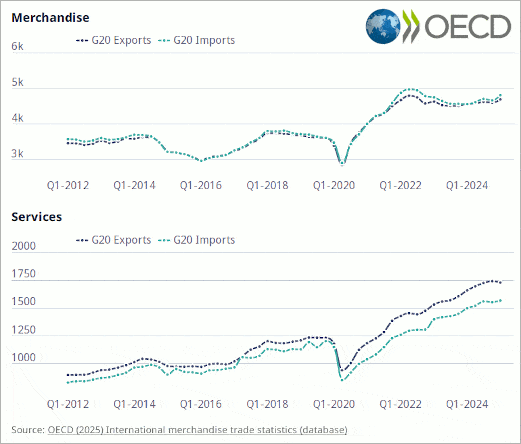
In the first quarter of 2025, the value of trade
of G20 nations has increased, with exports and
Imports that recorded cyclical growth
respectively by +2.0% and +3.1% compared to the fourth quarter
of 2024. Announcing this increase today, the Organisation for the
Economic Cooperation and Development (OECD) explained that
The increase in exports is mainly attributable to
to the European Union, while imports were driven by
United States.
In particular, North America recorded a performance
mainly positive in the exchange of goods. In the United States
exports increased by +3.5%, partly driven by
from the increase in sales of aircraft and computers, while the
Increased purchases of industrial supplies and pharmaceuticals
fuelled the growth of imports (+19.0%), with
the announcement of new tariffs by the US administration that
It has probably prompted importers to speed up shipments
in anticipation of higher future costs. In Canada,
exports increased by +4.1% supported by higher sales
motor vehicles and energy products, in particular oil
crude oil whose price has increased due to the fall in
stocks in the United States. Canadian imports have increased
by +1.9%, largely due to higher purchases of high-speed vehicles,
Engine and components.
Europe has recorded generally
Positive. Growth in goods exports has gained
momentum in the United Kingdom (+4.7%) and the European Union (+2.8%). The
Italy's exports increased by +3.0% driven by
mainly from pharmaceuticals and medical supplies, while
Germany recorded an increase of +0.8% in exports and
an increase of +2.0% in imports.
East Asia recorded trade results
Mixed. China's exports grew by +1.1%,
partly due to increased shipments of rare earths, while
imports into China, on the other hand, decreased by -3.7%, reflecting the
Fewer purchases of mechanical and electrical products, such as circuits
Integrated. Japan recorded an increase of +3.7% in
exports, mainly due to sales of ships and aircraft.
In contrast, weak sales in the automotive sector
weighed on Korean goods exports, which fell by
-4,3%.
Preliminary estimates for the first quarter of this year
also indicate a heterogeneous framework for trade in services
of the G20 nations, with exports declining quarterly by
-0.7% and imports increased by +1.0%. Exports of
services increased by +0.4% in the United States despite a
sharp decline in revenues from travel, while imports
grew by +2.5%. On the contrary, both exports (-3.2%)
whereas imports (-3.6%) contracted in Canada,
with lower spending on travel to the United States weighing on the
import data.
Trade in services continued to contract in France and
Germany, but marked a recovery in Italy with exports and
imports grew by +7.2% and +3.5% respectively.
Similarly, the United Kingdom has seen growth in both
exports (+1.7%) and imports (+4.6%).
Exports of services declined in Japan and Korea,
while imports increased by +6.1% and by
+2,3%. In China, exports of services have suffered a strong
contraction (-6.0%) mainly due to the reduction in revenues
deriving from transport and construction, while imports are
growth of +4.5%. Exports of services also declined
in Brazil (-1.2%) and India (-0.1%); the latter recorded
also a collapse in import growth (-9.1%).
